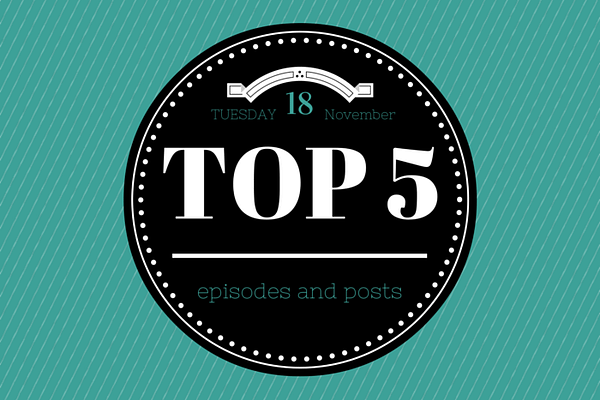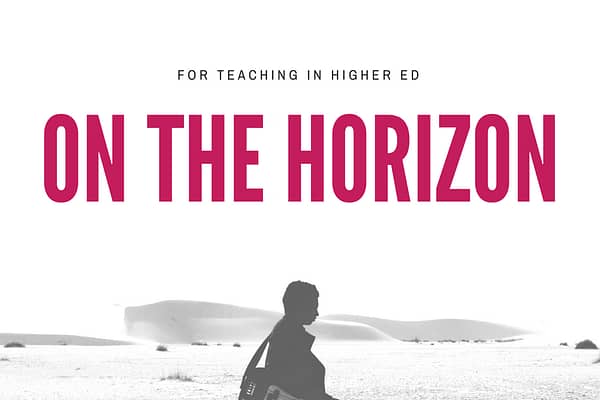Someone asked me the other day if it was strange listening to myself on podcasts.
I'm now doing a monthly Q&A show on Dave's (my husband's) Coaching for Leaders podcast, as well as the weekly Teaching in Higher Ed podcast. I listen to many of them before they air, so that I can create the show notes. All of them wind up in my listening queue on Overcast (my preferred podcast app). My weekly routine has me often listening to them in the car, or when feeding our baby girl at night.
There are often moments when I listen where I wish I would have phrased something differently, or not laughed when I talked about something quite serious. Lately, I'm frustrated at the number of times I'm saying the filler word “so” on the show. Prior to that, the recordings were littered with “you know”s. I'm always working on some aspect of my speech patterns that could potentially be distracting to the listening audience.
Yes, it can be uncomfortable to hear myself, especially during some of my less-than-stellar recording moments.
However, there are so many great things that have come from “working out loud,” a phrase first coined by Bryce Williams. When we work out loud, we make our work visible to a network of people with similar interests and missions as our own.
John Stepper describes working out loud as:
…making your work visible in such a way that it might help others. When you do that – when you work in a more open, connected way – you can build a purposeful network that makes you more effective and provides access to more opportunities.
Robbin Good has a content curation guide that explores emerging practices in content curation and how to get started. There's also this interview with Maria Popova, the editor of Brain Pickings, one of the greatest examples of content curation that exists. It almost feels wrong to refer to it as content curation, or even working out loud. She refers to her work in a far more descriptive and eloquent manner as she writes on her “about” page:
Brain Pickings is my one-woman labor of love — a subjective lens on what matters in the world and why. Mostly, it’s a record of my own becoming as a person — intellectually, creatively, spiritually — and an inquiry into how to live and what it means to lead a good life.
It is risky and takes dedication to work out loud, but the benefits are plentiful.
Get connected
The learning theory connectivism asserts that learning takes place through a network of connections. In today's digital age, more important than what you know is who you know. Being able to find where information is located is perceived as superior to having that knowledge in your head, particularly considering how quickly things change.
While I'm not sure the theory captures everything I believe about learning, I certainly see it as an important aspect of learning.
I am regularly reminded of connectivism when people tell me that they just don't understand why I use Twitter. I certainly didn't get the appeal, at first, either. However, now that I have all these connections to people far smarter than me, I get a daily dose of relevant and revolutionary knowledge each time I check in.
Be inspired
Working out loud can be risky, because there are plenty of critics out there in cyber space. However, I've found that the positive affirmations that have come my way far outweigh the negative interactions.
My two librarian friends, Mary Axford and Crystal Renfro, who write the Academic PKM blog have been so inspirational to me since I first learned about their work. They have a fabulous course on productivity for faculty and librarians, which is top notch. They also do their monthly Links Roundup posts that give readers additional resources to explore.
They were even so kind as to invest their time by being guests on the Teaching in Higher Ed podcast, episode 9.
By deciding to take the plunge and start the podcast, I have been able to get to interview people I highly respect and be inspired by their body of work. My sources of inspiration aren't limited to people I meet in person, but extend all around the world to people who are working tirelessly to be excellent at facilitating learning and caring for students.
Keep learning
When I want to explore what others in my field are doing, I can check out my teaching in higher ed Twitter list and soak in the learning. Peter Newbury‘s Twitter list of Centers for Teaching and Learning is full of resources for those who play a leadership role in faculty development at their institutions.
When working out loud, we don't stop at taking the information in, however. We follow Harold Jarche's advice and ask ourselves:
…what value can [we] provide?
Yes, we are all busy. However, with some thought put into our workflow and some practices and tools to make curation more efficient, we can add value and extend our own learning at the same time.
I know that I won't always get it right when I allow myself to be vulnerable enough to work out loud. However, for all the good things that have come of it, I'm not planning on stopping anytime soon.
[reminder]What are some of the benefits you are finding of working out loud?[/reminder]




Thanks for the shout out, Bonnie. Also thanks for the tip regarding Peter Newbury’s great Twitter list. On the topic of Teaching and Learning centers, you might be interested in a research guide that our team at GA Tech (Faculty Engagement) created on Teaching and Learning Resources. http://libguides.gatech.edu/teachingandlearning
Keep thinking out loud. People are interested in listening and learning. 🙂
Crystal
http://www.academicpkm.org